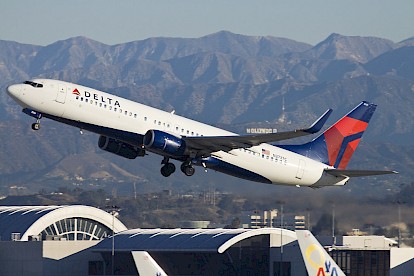Delta's carbon-neutral pledge is 'greenwashing,' California lawsuit says
 Delta Air Lines should pay damages to customers for misrepresenting itself as a carbon-neutral airline in marketing campaigns and advertisements that encouraged consumers to pay higher prices, a class-action lawsuit says.
Delta Air Lines should pay damages to customers for misrepresenting itself as a carbon-neutral airline in marketing campaigns and advertisements that encouraged consumers to pay higher prices, a class-action lawsuit says.
Delta has sought to achieve carbon neutrality at least in part via purchases in the carbon-offset market. Buyers in that market receive carbon credit, or the right to emit more carbon, if they invest in green programs such as anti-deforestation or helping people buy low-emission cook stoves.
But the offset market is replete with inaccurate accounting and exaggerations, according to the lawsuit, brought Tuesday by California resident Mayanna Berrin. This means Delta has not been carbon-neutral since it first promised to become so in March 2020, her attorneys wrote in a complaint. “Nearly all offsets issued by the voluntary carbon offset market overpromise and underdeliver on their total carbon impact,” they wrote, citing studies and reports.
“Consumers can’t make informed eco-friendly choices if companies are misleading them,” attorney Jonathan Haderlein said.
“I felt comfortable paying more because I was neutralizing when I needed to travel for work or to see my family,” Berrin told the Associated Press. Berrin said she was frustrated after she started having doubts about Delta’s offsets.
Berrin could not be reached for comment, but her attorneys described her as in her late 20s and a writer at Nickelodeon.
Delta disputed the claims. The company is seeking to achieve net-zero carbon emissions by 2050, Delta said in a statement, and since March 31, 2022, “has fully transitioned its focus away from carbon offsets toward decarbonization of our operations,” by investing in sustainable aviation fuel and more fuel-efficient aircraft.
In 2020, Delta pledged to invest $1 billion over 10 years to reduce its carbon footprint, but it missed its target in 2021, The Washington Post reported. The airline then spent $137 million to buy carbon offsets to neutralize 27 million metric tons of carbon dioxide emissions.
Berrin’s attorneys said Delta had engaged in “greenwashing,” or the act of offering services that are branded as more eco-friendly than they actually are. “Greenwashing is difficult for consumers to identify,” they wrote, because “consumers cannot verify green attributes” in goods or services and must rely on corporate suggestions or labels.
The offset market has been popular among airlines and global companies such as Amazon and Volkswagen as a tool to show customers that they are reducing their carbon footprints.
But climate experts have expressed skepticism about the market.
A European Commission study found that 85 percent of offset projects failed to reduce emissions. An investigation by the Guardian newspaper in the United Kingdom, the German weekly Die Zeit and SourceMaterial, a nonprofit investigative journalism group, said more than 90 percent of rainforest carbon offsets are worthless. A 2019 ProPublica investigation found deforestation offsets in Brazil were ineffective or could not be properly measured.
Although the lawsuit could take at least several years, attorneys for Berrin said their case wasn’t “a fishing expedition.”
“We’re not guessing about the science. The fact is that it has been well-documented, especially abroad, that there are severe issues with the offsets that Delta relies upon,” Haderlein said.
You can return to the main Market News page, or press the Back button on your browser.

